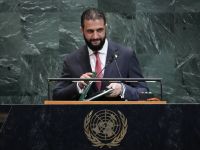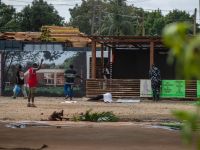Iranian Foreign Minister Kamal Kharazi described Sunday his first visit to Iraq as "positive", saying agreement had been reached to work together to settle outstanding issues.
"We have decided to work seriously to establish fair and good neighborly relations," said the first Iranian foreign minister to visit Baghdad in 10 years.
"We have agreed to re-open joint committees set up in 1997 and a working agenda," he told reporters before flying out in defiance of a decade-old air embargo.
Kharazi, who met President Saddam Hussein during his three-day stay, said he hoped "to hasten the settlement of problems related to the question of POWs and those who have disappeared, the exchange of remains of martyrs and solutions to unresolved humanitarian problems," since the 1980-1988 war.
He also said Iranian pilgrims would soon be returning to Shiite holy sites in Iraq after a suspension of the visits for what Baghdad described as "technical reasons".
A framework to restore trade between the two neighbors had also been looked at, he said, although Iraq has been under international sanctions since invading Kuwait in 1990.
Saddam, quoted in Sunday's official press, noted "a willingness and determination to normalize relations".
"Iraq has the will and the desire to settle unresolved questions in the interests of two brother peoples," he said.
Iraqi Vice President Taha Yassin Ramadan proposed in comments published in the press to increase official visits and reconvene the joint commissions quickly.
Iranian television reported Saturday that Kharazi had told Saddam Iraq must respect a 1975 agreement, which fixed the southern borders between the two along the Shatt al-Arab borders and ended Kurdish rebellion.
Saddam, then vice-president, signed the deal with the Shah, but ripped it up on September 17, 1980, five days before the war erupted.
Tehran has repeatedly denied Baghdad's charges it still holds 29,000 Iraqi prisoners more than a decade after the end of their brutal 1980-1988 war. Iraq says another 60,000 are missing.
Iran in August released 728 Iraqi POWs that it said were the last still held, although Tehran acknowledges that some 9,000 others have stayed behind to seek asylum.
Iran claims that Iraq still holds some 3,000 Iranian soldiers, while Baghdad says it holds none but a handful who were involved in a regional uprising.
The disagreement ended the workings of a bilateral POW committee, but the Iran's state IRNA news agency said the two sides had now agreed to relaunch all frozen joint committees on prisoners as well as security, trade and other issues.
The presence of armed opposition groups on each other's territory is also an obstacle to improving relations.
Iran and Iraq never broke off diplomatic relations, even during the war, and promoted ties to the level of charge d'affaires in 1990.
Kharazi landed back in Tehran on Sunday aboard the same plane on which he flew into Baghdad on Friday -- BAGHDAD (AFP)
© 2000 Al Bawaba (www.albawaba.com)







